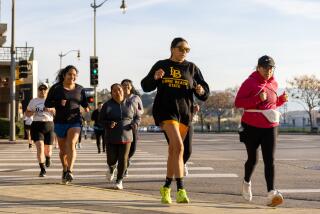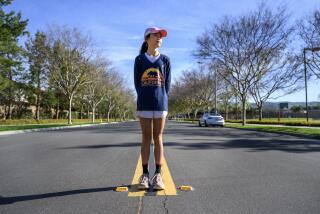Stride for Stride With Diabetes : Marathon Runner Challenges the Odds
- Share via
John Leon will have more than a sprained ankle or a leg cramp to worry about when he runs Sunday in the City of Los Angeles Marathon.
Leon, a 28-year-old telephone lineman from Mar Vista, suffers from diabetes, and the risks he will take in the marathon from a physiological standpoint are higher than those of other runners.
And he is a rarity among diabetics: Few have run marathons.
Rick Vaill, communications director of the American Diabetes Assn. Southern California Affiliate, said, “Of the estimated 12 million diabetics in the country, you could safely say that there are only a handful (who) participate in marathons on a regular basis.”
Running in marathons, which generally cover 26.2 miles, was Leon’s idea after he learned two years ago that he had diabetes.
Finally Went to Doctor
He had been experiencing excessive thirst and frequent urination and had been losing weight rapidly. After two months “I decided to go to a doctor. He admitted me to a hospital and explained to me that I had diabetes and that I would have to start taking insulin injections to control the disease.”
He also learned that proper diet and exercise are other controls for diabetes, and he said that in his case exercising helps. A casual jogger till then, he said that “I made it a point to exercise regularly and to look at running seriously.
“When I found out that exercise was encouraged, then I ran a lot more regularly. I started running 10 kilometers and then I ran a half-marathon. After I ran the half-marathon, I decided to run a full marathon.”
At first, he said, he decided to be his own trainer “and I picked up a book and read it to see what you have to do to run. And I began running longer distances.”
He said he then contacted his physician, Dr. Neil Goldberg, a Culver City internist and endocrinologist, and told him that he had been running long distances and thought that he was ready to run a marathon.
Professional Help
“When I told him the amount of running I’d been doing, the mileage I’d been getting under my belt, he made some phone calls.”
One was to Mark Currie, an exercise physiologist at the Center for Health Promotion, an outpatient facility of Beverly Hills Medical Center.
Currie worked with Leon and helped him sharpen his running skills. Leon said Currie put him on a training schedule and monitored his runs to make sure that Leon’s body was doing what it was supposed to do.
Katie Eisenberg, a nurse at the health center who specializes in diabetes, said that diabetics lack the insulin to carry glucose to individual cells and give the body the energy it needs and that marathon running greatly increases the body’s energy usage.
Eisenberg said diabetes is a metabolic disorder that interferes with the body’s ability to utilize its main nutrients: protein, fats and glucose.
Daily Insulin Shots
“Glucose is the basic molecule of energy or fuel for each individual cell,” Eisenberg said. “And diabetes is related to an underlying problem called insulin. Insulin is a hormone that’s secreted by the pancreas and attaches itself to the glucose molecule. It carries the glucose out of the blood and into each individual cell.”
Leon controls diabetes by taking insulin shots daily, dieting and exercising. But he can still run the risk of not having enough sugar in his blood, a condition known as hypoglycemia.
Currie and Eisenberg have helped Leon minimize that risk in the marathon. They will monitor his glucose and blood-sugar rate during the run.
“We will supply him with a needle, and sometime during his run he will prick his finger and drop a droplet of blood on a chemical strip,” Currie said. “We will take the strip and test his blood glucose level, and if he needs glucose, than we will catch up to him and give him some Gatorade or something like that.”
He Tested Himself
Eisenberg said that Leon wouldn’t be able to run Sunday’s if not monitored. Before he was under supervision at the health center, Leon said that he guarded against low blood-sugar problems on his shorter training runs by carrying a tube of pure liquid sugar. He would prick his finger and place the blood on a chemical strip and compare the reaction to a chart that was listed on the bottle the strips came in. If his blood sugar was low, he would ingest the pure sugar. If it was still too low, he would stop at a store for candy or drink orange juice if close to home.
He said he began training for the marathon last August and runs 40 to 50 miles a week. He runs seven miles a day for six days each week and 12 to 20 miles on Sundays.
He finished the recent Santa Barbara Marathon. “That run was primarily a training run,” Leon said, adding that Currie and Eisenberg “wanted to make sure I could actually finish and monitor me to make sure that I wouldn’t have any problems in a race.”
Currie said that with the risk factors involved, they didn’t feel comfortable in having Leon run the Los Angeles marathon without knowing what he would have to face. So he entered the Santa Barbara marathon.
No Disadvantage
Leon does not feel he will be at a disadvantage Sunday. “We’ll all experience the same pain in running. The only difference for me is maintaining my sugar level.”
He said he has adjusted well to diabetes. “I was devastated when I found out--I didn’t know what to expect, whether I could continue doing the things I loved doing. But I found out that through proper guidance you can control the disease, and you can do anything that you want to do. That’s the point I would like to tell others.”
Leon said he lives a normal life with wife Pam and children Rich, 4, and Christina, 2. He enjoys camping, fishing, scuba diving and playing softball.
Leon will not only be running for himself Sunday but also for the American Diabetes Assn. He’s taking pledges of money for each mile he runs and, with money pledged so far, will raise $850 for the ADA if he finishes the race.
“A lot of friends--and people I really don’t know--heard about what I’ve been doing and think it’s a neat idea. And they’ll be there to cheer me on.”
The marathon will start at 9 a.m. at the Coliseum, which is also the finish line, and Leon’s goal is to finish. Winning would be great, he said, but it’s participating that is important.


